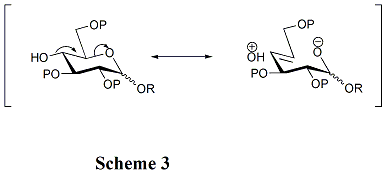Carbohydrate synthesis
 File:Scheme2(Lu).gif
File:Scheme2(Lu).gif 
 Carbohydrate synthesis refers to the series of enzyme-catalyzed reactions that produce carbohydrates in living organisms as well as the chemical synthesis of carbohydrates in the laboratory. Carbohydrates are essential for various biological processes, serving as energy sources, structural components, and playing critical roles in cell signaling. The synthesis of carbohydrates can be divided into two main categories: biosynthesis, which occurs in living organisms, and chemical synthesis, which is performed in laboratory settings.
Carbohydrate synthesis refers to the series of enzyme-catalyzed reactions that produce carbohydrates in living organisms as well as the chemical synthesis of carbohydrates in the laboratory. Carbohydrates are essential for various biological processes, serving as energy sources, structural components, and playing critical roles in cell signaling. The synthesis of carbohydrates can be divided into two main categories: biosynthesis, which occurs in living organisms, and chemical synthesis, which is performed in laboratory settings.
Biosynthesis of Carbohydrates[edit | edit source]
The biosynthesis of carbohydrates is a vital process in all living organisms. It involves the formation of simple sugars, like glucose, from smaller molecules such as carbon dioxide and water through a process known as photosynthesis. This process primarily occurs in plants and certain types of bacteria and algae. The simple sugars produced can then be converted into more complex carbohydrates like starch and cellulose through various enzymatic processes.
Photosynthesis[edit | edit source]
Photosynthesis is the primary method through which carbohydrates are synthesized in nature. It can be summarized by the equation: \[6CO_2 + 6H_2O + light energy \rightarrow C_6H_{12}O_6 + 6O_2\] This process takes place in the chloroplasts of plant cells, where light energy is converted into chemical energy, producing glucose and oxygen as byproducts.
Glycogenesis[edit | edit source]
Glycogenesis is the process of glycogen synthesis, in which glucose molecules are added to chains of glycogen for storage. This process occurs in the liver and muscle tissues of animals and is crucial for energy storage.
Other Pathways[edit | edit source]
Other important biosynthetic pathways include the pentose phosphate pathway, which generates ribose-5-phosphate for nucleotide synthesis, and the Calvin cycle, which converts carbon dioxide into glucose in plants.
Chemical Synthesis of Carbohydrates[edit | edit source]
Chemical synthesis of carbohydrates involves the formation of complex carbohydrates from simpler ones or from other starting materials in the laboratory. This process is crucial for the production of carbohydrates that are rare in nature or for the synthesis of specific carbohydrate molecules for research and therapeutic purposes.
Glycosylation Reactions[edit | edit source]
Glycosylation reactions are key in the chemical synthesis of carbohydrates. These reactions involve the formation of glycosidic bonds, linking monosaccharide units to form complex carbohydrates. Various strategies have been developed to control the stereochemistry and regiochemistry of these reactions, making it possible to synthesize specific carbohydrate structures.
Applications[edit | edit source]
The synthesis of carbohydrates has numerous applications in both research and industry. In research, it allows for the study of carbohydrate function and the development of carbohydrate-based drugs. In industry, synthesized carbohydrates are used in food production, pharmaceuticals, and as biofuels.
Challenges[edit | edit source]
One of the main challenges in carbohydrate synthesis is the control of stereochemistry due to the presence of multiple chiral centers in carbohydrates. This makes the synthesis of specific carbohydrate structures complex and often requires multiple steps and protection-deprotection strategies.
Conclusion[edit | edit source]
Carbohydrate synthesis, both biosynthetic and chemical, is a complex but crucial area of study in biochemistry and organic chemistry. It not only provides insight into the fundamental processes of life but also has significant applications in various industries.
Search WikiMD
Ad.Tired of being Overweight? Try W8MD's physician weight loss program.
Semaglutide (Ozempic / Wegovy and Tirzepatide (Mounjaro / Zepbound) available.
Advertise on WikiMD
|
WikiMD's Wellness Encyclopedia |
| Let Food Be Thy Medicine Medicine Thy Food - Hippocrates |
Translate this page: - East Asian
中文,
日本,
한국어,
South Asian
हिन्दी,
தமிழ்,
తెలుగు,
Urdu,
ಕನ್ನಡ,
Southeast Asian
Indonesian,
Vietnamese,
Thai,
မြန်မာဘာသာ,
বাংলা
European
español,
Deutsch,
français,
Greek,
português do Brasil,
polski,
română,
русский,
Nederlands,
norsk,
svenska,
suomi,
Italian
Middle Eastern & African
عربى,
Turkish,
Persian,
Hebrew,
Afrikaans,
isiZulu,
Kiswahili,
Other
Bulgarian,
Hungarian,
Czech,
Swedish,
മലയാളം,
मराठी,
ਪੰਜਾਬੀ,
ગુજરાતી,
Portuguese,
Ukrainian
Medical Disclaimer: WikiMD is not a substitute for professional medical advice. The information on WikiMD is provided as an information resource only, may be incorrect, outdated or misleading, and is not to be used or relied on for any diagnostic or treatment purposes. Please consult your health care provider before making any healthcare decisions or for guidance about a specific medical condition. WikiMD expressly disclaims responsibility, and shall have no liability, for any damages, loss, injury, or liability whatsoever suffered as a result of your reliance on the information contained in this site. By visiting this site you agree to the foregoing terms and conditions, which may from time to time be changed or supplemented by WikiMD. If you do not agree to the foregoing terms and conditions, you should not enter or use this site. See full disclaimer.
Credits:Most images are courtesy of Wikimedia commons, and templates, categories Wikipedia, licensed under CC BY SA or similar.
Contributors: Prab R. Tumpati, MD
